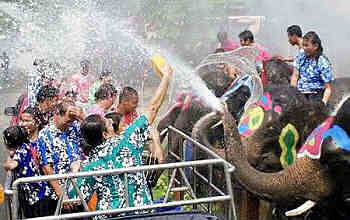While the official calendar in the kingdom of Thailand is the Western Gregorian calendar, a traditional Thai lunar calendar is very much in use mainly to determine Buddhists holidays. Thai ancient lunar calendar distinguishes itself from Islamic and other lunar calendars by being found based on the yearly agricultural cycle, as it was the most important aspect of the primarily agrarian society. Thai ancient lunar calendar is divided into 12 lunar months, like the western calendar, but the months are determined by phases of the moon rather than by a position of the earth in relation to the sun. Being based on the cycles of moon phases, half of the lunar months are 28-days-long and another half is 29. Thai lunar month is also divided into four weeks. |
| Thu-Fri, January 1-2 | New Year's Day | National Holiday| Mon, January 26 | Chinese New Year of the Ox | Public Holiday * | Mon, February 9 | Makha Bucha day | National Holiday | Mon, April 6 | Chakri Day | National Holiday | Mon-Wed, April 13-15 | Songkran (Thai New Year) | National Holiday | Fri, May 1 | Labor Day | National Holiday | Tue, May 5 | Coronation Day | National Holiday | Fri, May 8 | Visakha Bucha Day | National Holiday | Tue, July 7 | Buddhist Lent Day | National Holiday | Wed, August 12 | Queen's Birthday | National Holiday | Fri, October 23 | Chulalongkorn Day | National Holiday | Mon, November 2 | Loy Kratong Festival | Public Holiday * | Sat-Mon, December 5-7 | King's Birthday | National Holiday | Thu, December 10 | Constitution Day | National Holiday | Fri, December 25 | Christmas | Public Holiday * | Thu, December 31 | New Years Eve | National Holiday | * During informal public holidays the government offices, banks, and other nationwide businesses are commonly open for business. Although government offices, schools, and businesses are closed during the national holidays, the bulk of the tourist attractions, shops, malls, as well as currency exchange booths are almost never closed. | |||
Major Thai Celebrations Holidays and FestivalsLoi Krathong Fireworks and candles lit the spirit of Loi Krathong celebrations Loy Krathong (or Loi Krathong) festival a.k.a. the Festival of Light is one of the most popular and truly romantic Thai traditional festivals. Loy Krathong means "to float a raft". Festival's exact date changes every year and it is not an official public holiday in Thailand. The festivities of Loy Krathong kick-off in the evening after dark.
Artistic public presentations of girls in Thai customary dresses, Thai traditional music along with dance performances, and beauty pageants accompanied Loy Krathong festival are called "Nopphamat Queen Contests". Highly popular amongst the general public, they take place all over Thailand: in kindergartens, schools, colleges, universities, and other private, public, and government establishments. The festival is also associated with the craft of fruit and vegetable carving contests and flower arrangement fairs. Chinese Lunar New Year Chinese New Year Celebrations in Bangkok's Chinatown Chinese New Year (January to February) usually celebrated for three days, starting on the day before the Chinese New Year's Eve. The dates of Chinese New year are observed according to the lunar calendar on the second new moon day following winter solstice (when the sun is at its southernmost point, December 22). Although not a national holiday, the Chinese Lunar New Year is extensively celebrated throughout Thailand with one of the biggest and vibrant festivities is held in Bangkok's Chinatown.  Lion Dance Performance During Chinese New Year in Bangkok The lion and dragon dances, sounds of the firecrackers and fireworks are integral features of Chinese New Year festivities. The drums will resemble the lion's heartbeat and help to show all the emotions the lion may feel. Red is the lucky colour that everyone wears in order to celebrate the Chinese Lunar New Year. The streets of Yaowarat and vicinity (Bangkok's Chinatown district) are ablaze with red Chinese lanterns and banners, and of course great Chinese food all over.
Songkran Throwing of water during Songkran celebrations Songkran Festival (13 to 15 April) is certainly the biggest party of the year. Also known as traditional Thai New Year, the festival celebrates the end of the dry season, and has always involved water. Often called the Water Festival, it is the most celebrated event in Thailand. Everyone is happy, participating in the fun feast.  Nowadays, Songkran is associated with exuberant water fights with water guns, hoses and the like. It is celebrated mainly in the streets, which are all wet. One big wild party, a water parade of sorts, a giant water-gun extravaganza and no one stays dry. |
Can't Find What You're Looking For à±¼ Tell Us What You Want.
Let Your Friends Know à±¼ Invite Them to Visit Us!
Want Tour to Thailand à±¼ Travel Promotion Vacation Package!